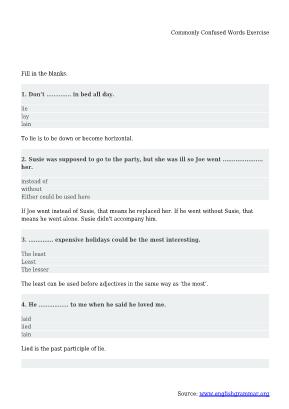Bài tập về từ ngữ thường bị nhầm lẫn trong Tiếng Anh
Bạn đang xem tài liệu "Bài tập về từ ngữ thường bị nhầm lẫn trong Tiếng Anh", để tải tài liệu gốc về máy bạn click vào nút DOWNLOAD ở trên

Commonly Confused Words Exercise Source: www.englishgrammar.org Fill in the blanks. 1. Don’t .. in bed all day. lie lay lain To lie is to be down or become horizontal. 2. Susie was supposed to go to the party, but she was ill so Joe went ...................... her. instead of without Either could be used here If Joe went instead of Susie, that means he replaced her. If he went without Susie, that means he went alone. Susie didn't accompany him. 3. .. expensive holidays could be the most interesting. The least Least The lesser The least can be used before adjectives in the same way as ‘the most’. 4. He .. to me when he said he loved me. laid lied lain Lied is the past participle of lie. Commonly Confused Words Exercise Source: www.englishgrammar.org 5. She didn’t let me what she was writing. see to see Let is followed by an infinitive without to. 6. After questioning they were . home. allowed to go let go Let is not normally used in passive forms. 7. My parents had . hard life a hard life Either could be used here When 'life' refers to the whole of a person’s life, it is normally countable and is used with articles. 8. I .. you and your husband. like very much very much like Either could be used here Very much cannot go between like and its object. 9. I waited but he didn’t arrive. long for a long time Either could be used here Commonly Confused Words Exercise Source: www.englishgrammar.org Long is mainly used in questions and negatives. In affirmative clauses, we use for a long time. 10. .. carefully – it is moving. Look Look at Look in No preposition is used when there is no object after look. 11. Paper is made wood. of off with from When a material is changed into a totally different form to make something, we use make from. 12. You work tomorrow if you don’t want to. needn't don't have to Either could be used here Needn’t and don’t have to mean the same. PLAY AGAIN ! Answers 1. Don’t lie in bed all day. 2. Susie was supposed to go to the party, but she was ill so Joe went instead of her. 3. The least expensive holidays could be the most interesting. 4. He lied to me when he said he loved me. Commonly Confused Words Exercise Source: www.englishgrammar.org 5. She didn’t let me see what she was writing. 6. After questioning they were allowed to go home. 7. My parents had a hard life. 8. I very much like you and your husband. 9. I waited for a long time but he didn’t arrive. 10. Look carefully – it is moving. 11. Paper is made from wood. 12. You needn’t / don’t have to work tomorrow if you don’t want to.
Tài liệu đính kèm:
 bai_tap_ve_tu_ngu_thuong_bi_nham_lan_trong_tieng_anh.pdf
bai_tap_ve_tu_ngu_thuong_bi_nham_lan_trong_tieng_anh.pdf





